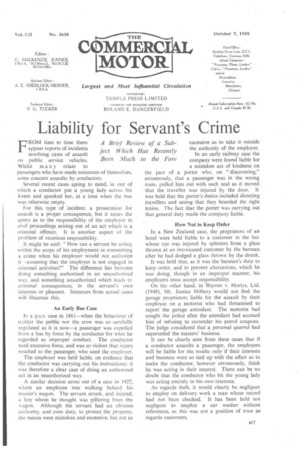Liability for Servant's Crime
Page 35

If you've noticed an error in this article please click here to report it so we can fix it.
FROM time to time there appear reports of incidents involving cases of assault on public service vehicles. Whilst many relate to passengers who have made nuisances of themselves, some concern assaults by conductors.
Several recent cases spring to mind, in one of which a conductor put a young lady across his knees and spanked her, at a time when the bus was otherwise empty.
For this type of incident, a prosecution for assault is a proper consequence, but it raises the query as to the responsibility of the employer in civil proceedings arising out of an act which is a criminal offence. It is another aspect of the problem of vicarious responsibility.
It might be said: "How can a servant be acting within the scope of his employment in committing a crime when his employer would not authorize it –assuming that the employer is not engaged in criminal activities?" The difference lies between doing something authorized in an unauthorized way, and something unauthorized which leads to criminal consequences, in the servant's own interests or pleasure. Instances from actual eases will illustrate this.
An Early Bus Case In a p.s.v. case in 1861—when the behaviour of neither the public nor the crew was so carefully regulated as it is now—a passenger was expelled from a bus by force by the conductor for what he regarded as improper conduct. The conductor used excessive force, and was so violent that injury resulted to the passenger, who sued the employer.
The employer was held liable, on evidence that the conductor was carrying out his instructions; it was therefore a clear Case of doing an authorized act in an unauthorized way.
A similar decision arose out of a case in 927, where an employee was walking behind his master's wagon. The servant struck, and injured, a boy whom he thought was pilfering from the wagon. Although the servant had an obvious authority, and .even duty, to protect the property, the means were mistaken and excessive, but not so excessive as to take it outside the authority of the employer.
In an early railway case the company were found liable for a mistaken act of kindness on the part of a porter who, on "discovering," erroneously, that a passenger was in the wrong train, pulled him out with such zeal as it moved. that the traveller was injured by the door. It was held that the porter's duties included directing _travellers and seeing that they boarded, the right trains. The fact that the porter was carrying out that general duty made the company liable.
How Not to Keep Order In a New Zealand case, the proprietors of an hotel were held liable to a customer in the bar whose eye was injured by splinters from a glass thrown at art intoxicated customer by the barman after he had dodged a glass thrown by the drunk.
It was held that, as it was the barman's duty to keep order, and to prevent altercations, which he was doing, though in an improper manner, his emproyers must accept responsibility.
On the other hand, in Warren v. Henlys, Ltd. (1948), Mr. Justice Hilbery would not find the garage proprietors liable for the assault by their employee on a motorist who had threatened to report the garage attendant The motorist had sought the police after the attendant had accused him of refusing to surrender his petrol coupons. The judge considered that a personal quarrel had superseded the masters' business.
It can be clearly seen from these cases that if a conductor assaults a passenger, the employers will be liable for the results only if their interests and business were so tied up with the affair as to make the conductor, however erroneously, think he was acting in their interest. There can be no doubt that the conductor who hit the young lady was acting entirely in his own interests.
As regards theft, it would clearly be negligent to employ on delivery work a man whose record had not been checked. It has been held not negligent to employ a car washer without references, as this was not a position of trust as regards customers.
















































































































